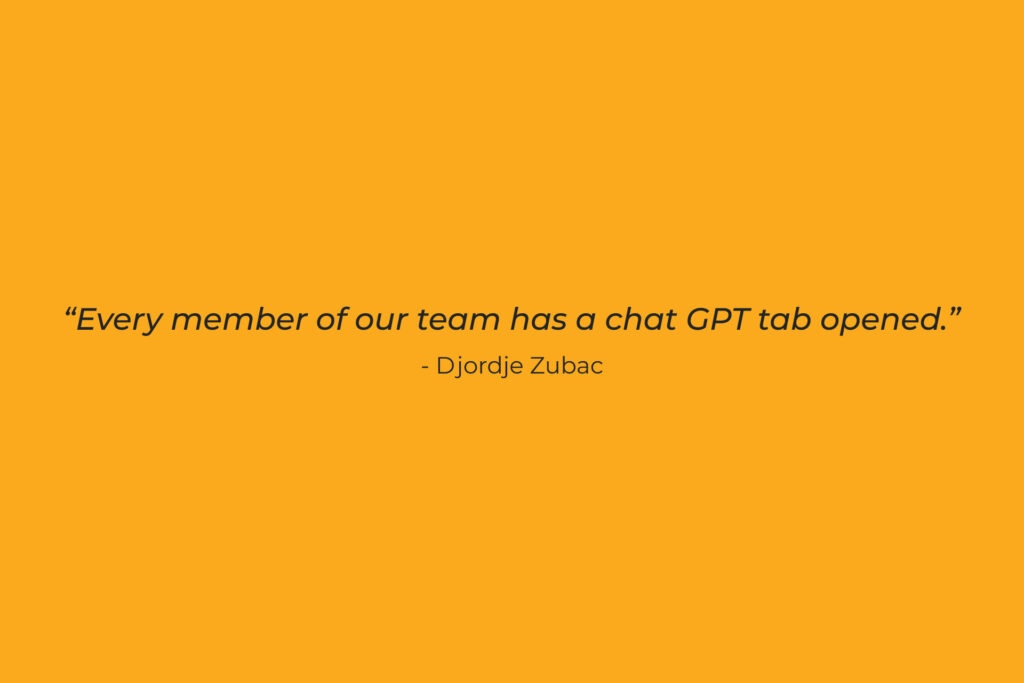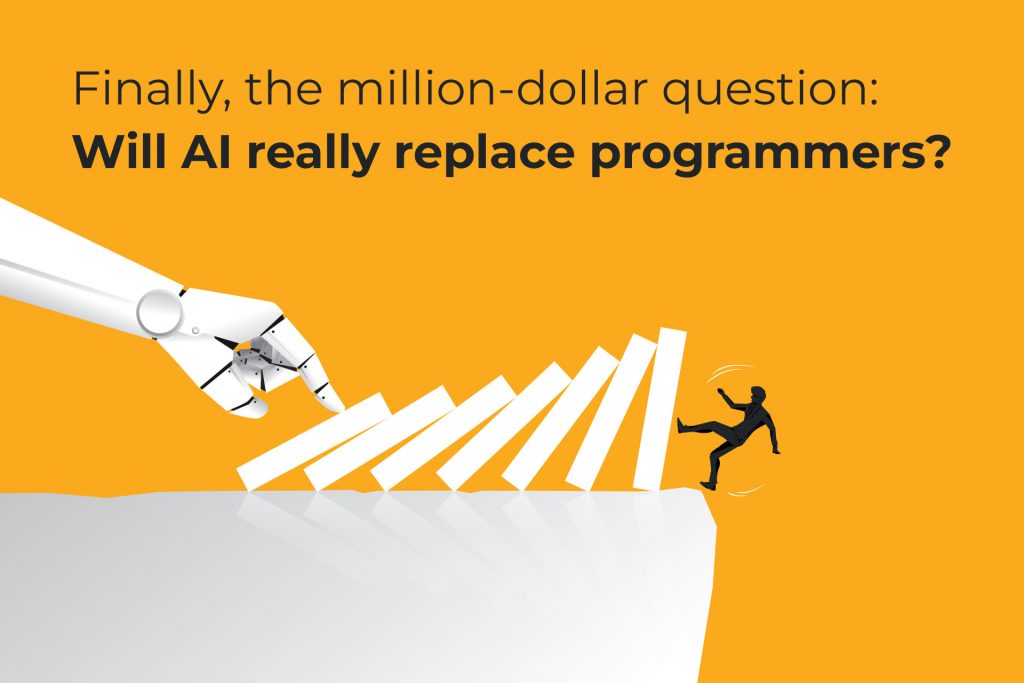In this digital world, the possibilities of what new technology can do are seemingly endless.
As mankind continues to explore and innovate, many have started to wonder where our current tech advances may take us in the future.
One question is asked very often these days: will artificial intelligence (AI) replace software engineering?
While this topic has sparked a heated debate between tech professionals, it is still unclear whether or not developer jobs will become obsolete as AI takes over.

So, in this blog post, we’ll discuss both sides of the argument:
- exploring if it is possible that AI could eventually outsmart software engineering and render it irrelevant,
- or our dear developers will still be around for a long time.
How does AI affect software engineering?
Although AI has its limitations for now, with every advancement, it becomes even more impactful. There are several ways that AI affects (or maybe helps) software engineering:
- AI can automate mundane tasks and provide automation insights that would be awfully time-consuming for humans to obtain. (such as code generation, testing, and bug fixing.)
- It can be used to improve the performance and functionality of software systems.
- AI and machine learning (ML) algorithms can solve bugs.
- What used to take days due to manual coding by a human, can now take minutes with the help of AI.
- AI technology allows programmers to determine errors in their code as it is written.
- Software engineers are able to focus on larger-scale projects and come up with ingenious solutions that wouldn’t have been possible years ago.
- AI can be integrated into software products to provide new features and capabilities, such as natural language processing, image recognition, and decision-making.

However, the use of AI in software engineering also raises new challenges – such as the need for specialized knowledge and skills, the complexity of designing and testing AI-based systems, and the ethical and legal implications of their use.
So, AI truly is revolutionizing the world of software engineering.
Can AI do coding?
Yes, AI can do coding. (somehow)
While it may not be able to challenge experienced coders right now, you’ll find that AI coding is becoming increasingly popular, with many tech companies using it to cut down on labor costs and increase accuracy.
And as AI progresses, this form of coding will likely become even more efficient and complex.

However, AI is not capable of “understanding” or “creating” code in the same way as a human. AI-assisted coding still requires human supervision and understanding to ensure that the generated code is correct, efficient, and maintainable.
In summary, AI can assist software developers in certain coding tasks, but it’s not yet at the point where it can replace them completely in coding.
What experts say – Can AI replace engineers?
Experts generally agree that AI is not currently capable of replacing engineers in the near future, but some believe that AI will play a more substantial role in engineering fields very soon.
Here are some opinions of experts in the field of software engineering that we have singled out:
Example 1:
A new artificial intelligence (AI) system called AlphaCode is bringing humanity one step closer to that vision, according to a new study. Researchers say the system might one day assist experienced coders but probably cannot replace them.
“It’s very impressive, the performance they’re able to achieve on some pretty challenging problems,” says Armando Solar-Lezama, head of the computer-assisted programming group at the Massachusetts Institute of Technology.

Example 2:
Submitting from different clusters allows AlphaCode to test a wide range of programming tactics.
“That’s the most innovative step in AlphaCode’s process” – says Kevin Ellis, a computer scientist at Cornell University.
Example 3:
To further test its prowess, DeepMind entered AlphaCode into online coding competitions. In contests with at least 5000 participants, the system outperformed 45.7% of programmers.
“It continues to be impressed how well machine-learning methods do when you scale them up.” – says also Kevin Ellis who works in AI coding.
Example 4:
“Even if this kind of technology becomes supersuccessful, you would want to treat it the same way you treat a programmer within an organization.
You never want an organization where a single programmer could bring the whole organization down.” – Solar-Lezama says, head of the computer-assisted programming group at the Massachusetts Institute of Technology.

Example 5:
Eric Elliott talked about GTP-3 on his Twitter account:
“Doing a code review right now – saw some code I did not immediately follow, so instead of mentally running the code line-by-line like I normally would, I pasted it into GPT-3 and asked questions. GPT-3 explained the code to me – correctly.”
So, these attitudes of experts about AI in software engineering make us wonder If GTP-3 can do all this, imagine what GTP-4 can achieve then?
Example 6:
Djordje Zubac Backend developer in custom software development company Code Bears told us the following:
Nowadays, every member of our team uses chat GPT to solve coding problems. Everyone has a chat GPT tab opened.
I can make three significant use cases for chat GPT:
- Using chat GPT for acquiring short answers to simple and accurate questions. If we need simple information, for example: What is older, next.js or nuxt.js. Chat GPT can provide a detailed answer. Or maybe: how to remove an element from an array in JS? Chat GPT will provide a function or a short code for solving that problem.
- Using chat GPT for making decisions. I personally use chat GPT to help me decide on database design. It gives me a solution, a good enough one, for a table structure. I analyze the solution, modify it, and then the coding is the easiest part. It can also help me decide on which technology or library should be used for a certain feature or application. Remember, this is just a tool that HELPS you make a decision, but YOU are the one that makes it.
- Using chat GPT for solving complex problems. Let’s say there is a complex database query that has to be written or a complex algorithm that has to be implemented. My team and I formulate the question as precisely and as detailed as possible and then chat GPT is capable of writing a SQL query or an algorithm in ANY language. We read it and then use it in our code. It is very important to emphasize that it can name variables, functions, classes, and everything else in the code very well. It also writes comments…

I would conclude by saying that AI services are tools that developers ought to use to stay competitive in the modern coding marketplace. Companies that use AI models have an upper hand over companies that don’t.
What does AI say about this topic?
We asked Chat GPT if will AI replace software engineers and it gave us the following answer:
“The question of whether AI will replace software engineers is a complex one and opinions on the matter vary. Some experts believe that AI has the potential to automate certain aspects of software development, such as code generation and testing, which could lead to increased productivity and efficiency. However, others argue that AI is not yet advanced enough to fully replace human software engineers, as it lacks the creativity, critical thinking, and problem-solving abilities of human software engineers.
Overall, while AI can assist software engineers in certain tasks, it is not yet advanced enough to fully replace them. It’s important to use AI responsibly, in combination with human oversight, to ensure that the resulting software is both effective and ethical.”
And its opinion is objective and realistic. Maybe that says this tool is on its way to perfection.
Finally, the million-dollar question: Will AI really replace programmers?
To conclude: Will AI replace software engineers?

As the Chat GPT says, this question is complex, and opinions on the matter vary, so it will be difficult to give the most correct answer.
All in all, AI can be used to automate some repetitive and time-consuming tasks, such as code generation, testing, and bug fixing, but it still requires human supervision and understanding to ensure that the generated code is correct, efficient, and maintainable.
It is perfect for some simple solutions and as a help, but it certainly cannot do more complex actions when it comes to programming.
AI can also provide new features and capabilities, such as natural language processing, image recognition, and decision-making, but it still needs human engineers to design, implement, test, and validate these features.
So don’t worry too much just yet – All this leads to the conclusion that AI helps people, but cannot replace them. At least not yet.
Thank you for reading!





